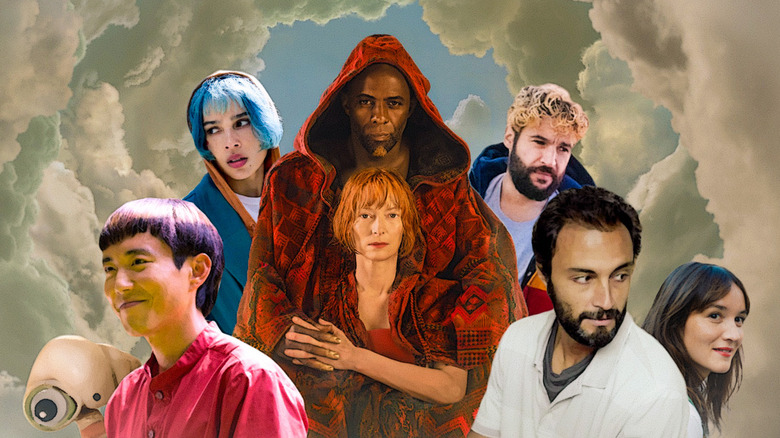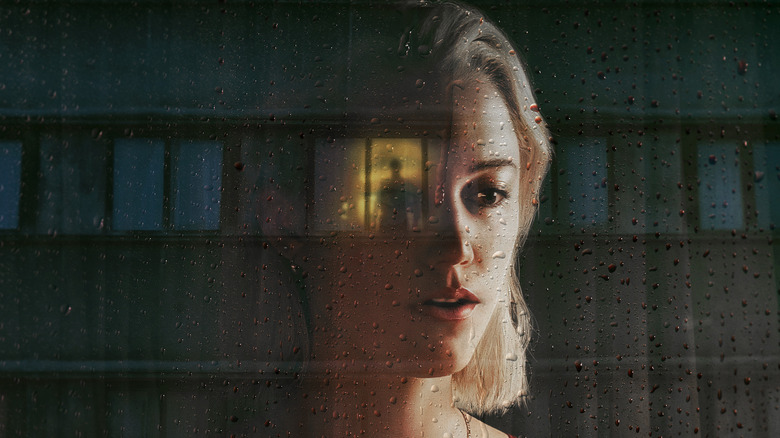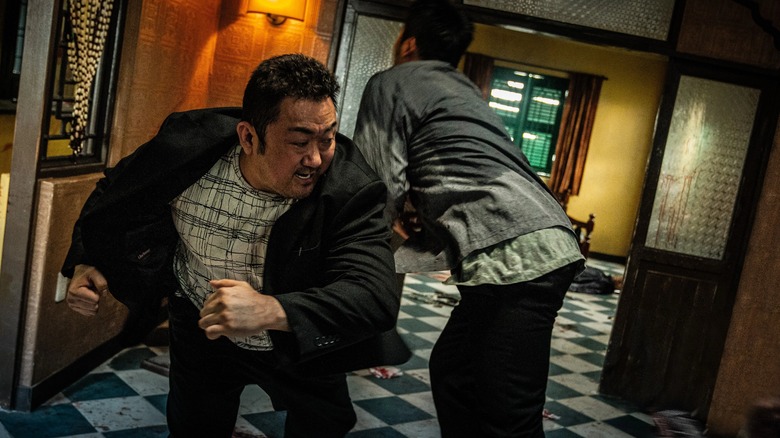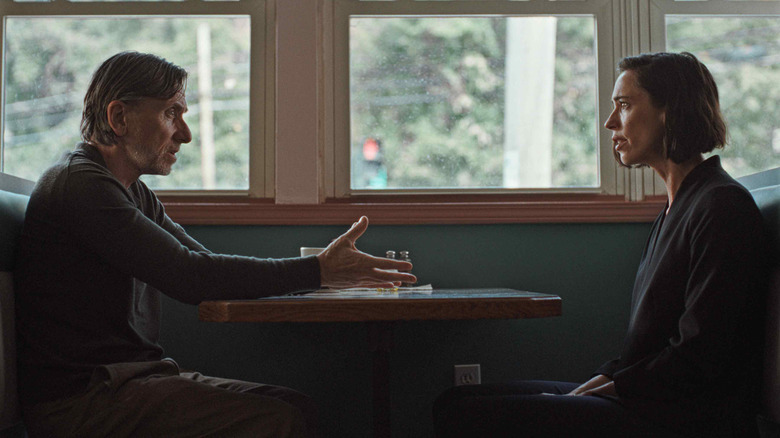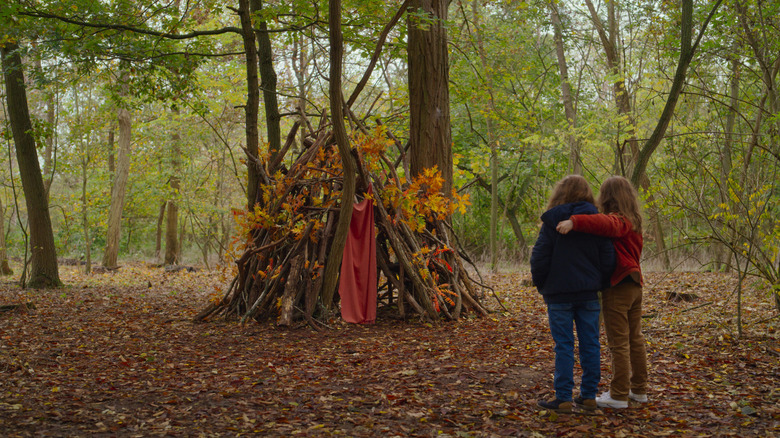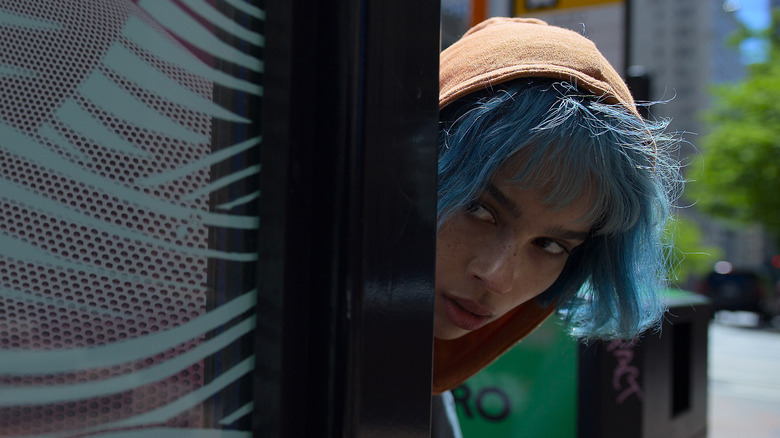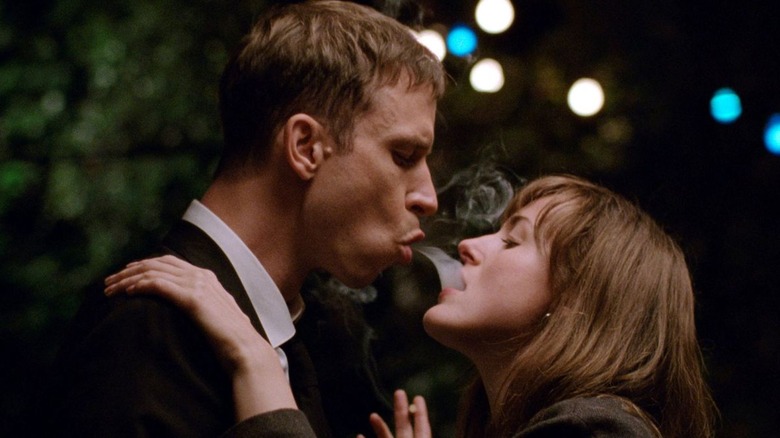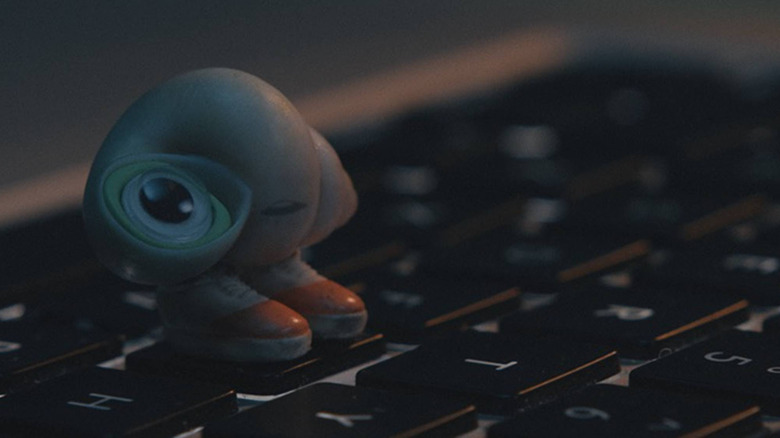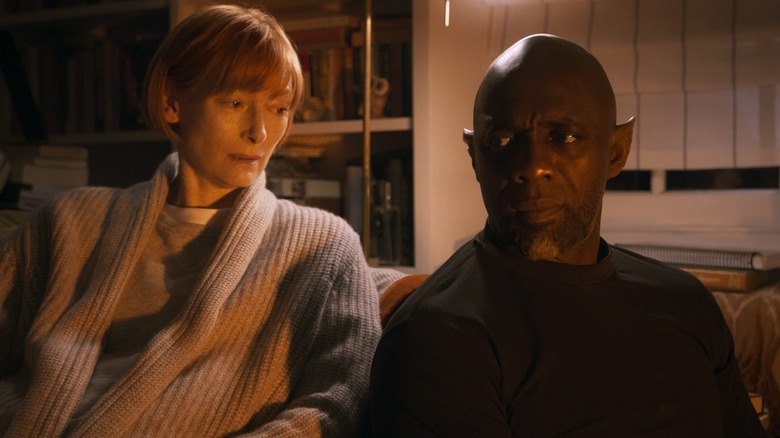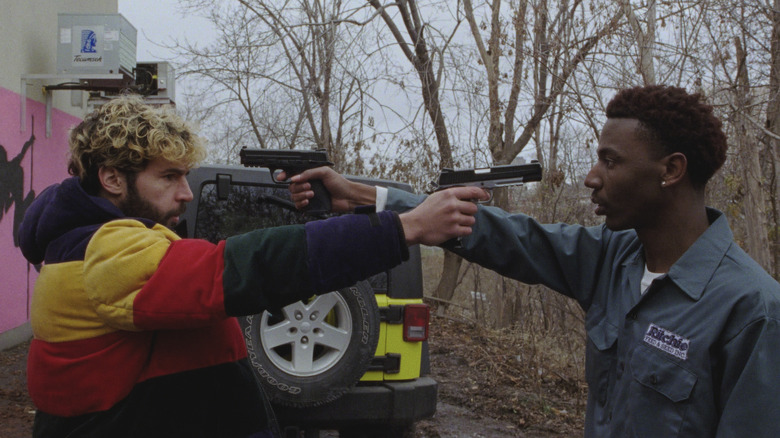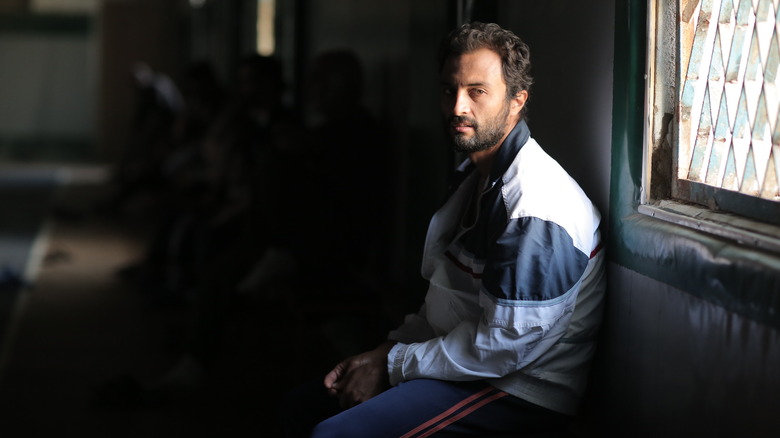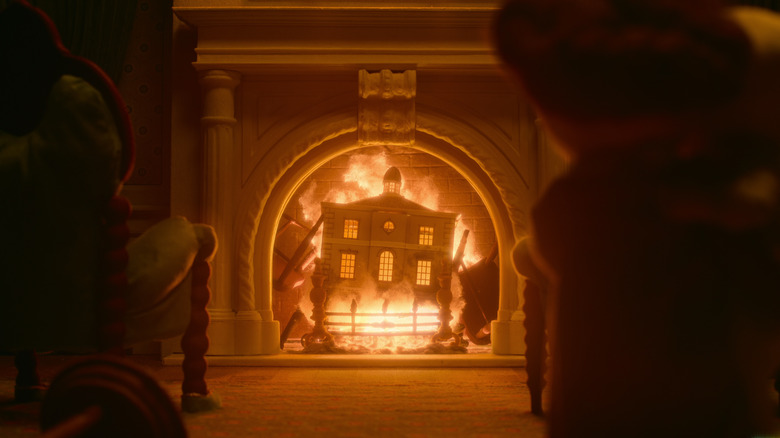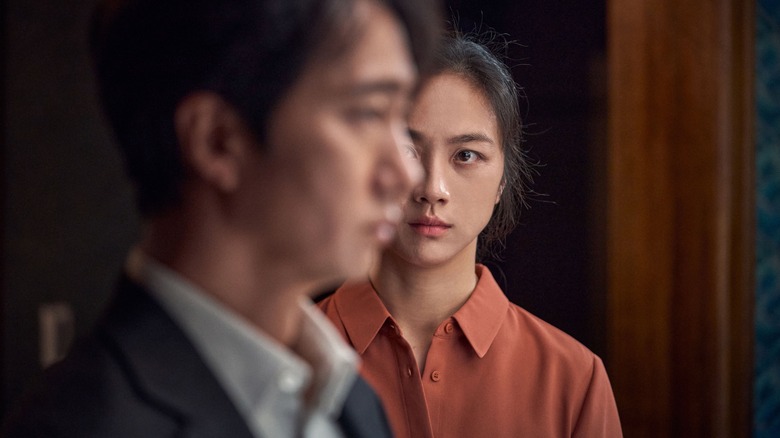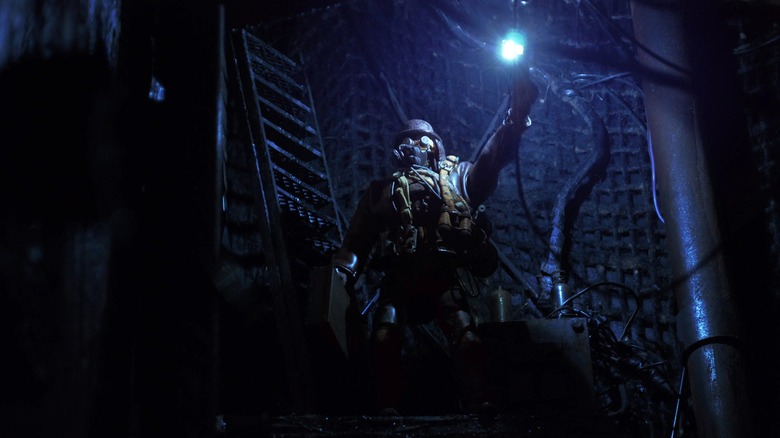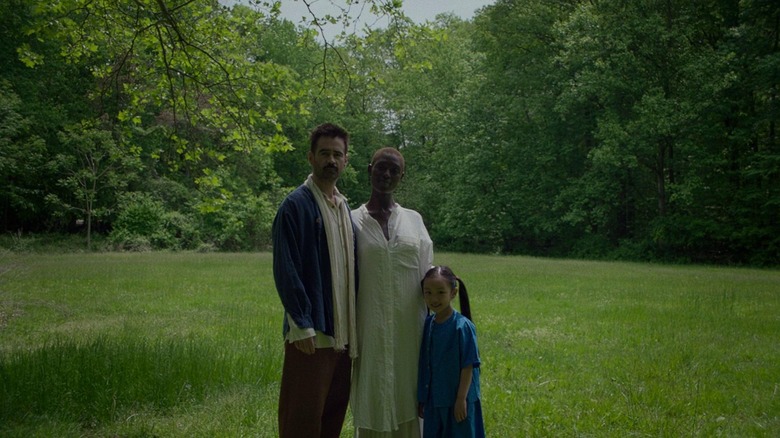The Best Movies You Totally Didn't Get Around To Seeing In 2022
While the pandemic has thrown the film industry off-kilter in a way that everyone's still scrambling to recover from, one crucial truth remains the same as in any other year: If you purposefully go out of your way to seek out the hidden gems that lie just off the beaten path, then there simply is no such thing as a bad year for film. In 2022 alone, new and exciting talents put everything on the line to make their voices known to the world. Meanwhile, the venerated old guard have come back again and again to prove that old dogs can, in fact, learn new tricks of the trade without missing a step. Movies of all shapes and sizes are as appealing as ever ... provided you're curious enough to know where to look.
For us film enthusiasts and pop culture junkies much too predisposed to tireless tangents and passionate pleas regarding our favorite under-the-radar offerings, may the following titles be the cure-all elixir to every demoralizing headline about box office flops and underperformers that deserved better. Blame can be pointed any which way for why event-sized blockbusters seem to be the only reliable way to bring audiences to the theaters. But let it be known that mid-budgeted adult fare, romantic dramas, foreign film, and the smallest indies (and everything in between) all continue to have a place in every movie-lover's heart.
The last 12 months may have been dominated by the absolute biggest and most spectacle-driven titles (have you heard about a recently-released little movie called "Avatar: The Way of Water"?), but a look just beyond the surface reveals what most of us already knew intuitively: 2022 was a tremendous year for film. Here's to the underseen gems that prove why.
15. Watcher
When you cast a thriller with names like Maika Monroe and Burn Gorman and a central mystery at its heart, it might feel relatively easy to guess how it all might unfold. The former, who has rapidly made a name for herself between "It Follows" and especially "The Guest" (though let's not look past her exceptional work in this year's "Significant Other," as well!), has breathed new life into the idea of the final girl. With her distinctively steely exterior that hints at hidden depths of brittleness underneath, Monroe has carved out an immensely successful niche for herself with some of the most fascinating horror/thrillers in recent years. And Gorman, of course, boasts a particularly menacing aura that threatens to leave him firmly in type-cast territory as the go-to villain.
Add that up and you'd be left with the feeling that "Watcher" might not have all that much new to offer. You'd be dead wrong.
"Watcher," director Chloe Okuno's feature debut, completely weaponizes its central casting — and our assumptions therein — to great effect. Monroe plays Julia, a fish-out-of-water former actor who has moved with her partner Francis (Karl Glusman) to the unfamiliar world of Bucharest. Muted and leeched of color entirely, the drab atmosphere of the film quickly permeates the entire picture and lends an oppressive quality to Julia's struggles to integrate. Naturally, that coincides with reports of a local serial killer on the loose — along with Julia's nagging feeling that the shadowy figure (Gorman) staring out from the apartment window across the street is watching her from a distance and dogging her every step.
What follows is a tense, moody, and slow-burning drama that deftly explores the concept of gaslighting without any accompanying preachiness or condescension. And it's more than worth a watch.
14. The Roundup
The rumors of South Korean cinema only springing into existence alongside the Best Picture-winning and breakthrough hit "The Parasite" have been greatly exaggerated. In the eyes of far too many, the country's output can be summed up by the contributions of acclaimed and undeniably talented filmmakers Bong Joon-ho and Park Chan-wook. To the initiated, however, this only scratches the surface of the vast range of storytelling that the industry has to offer. Amid its more "prestigious" peers comes "The Roundup," the second in a planned 10-film(!) saga.
Starring the inimitable Ma Dong-seok, the series follows ace detective Ma Seok-do, who tends to use brawn more often when brains alone simply won't suffice. In this hard-hitting sequel (you don't need to see the original in order to make sense of "The Roundup," but you should check out 2017's well-received "The Outlaws" anyway), the action shifts to Vietnam and changes up the tone in the process, doubling down on the action comedy where the initial film played things relatively straight. A simple mission to repatriate a criminal back to South Korea becomes infinitely more complicated when our lead uncovers a murderous mob boss taking over, Kang Hae-sang (Son Suk-ku). Though the plot threatens to turn labyrinthine, viewers are helped along with exceedingly well-realized action choreography, consistently visceral sound design, and one elaborately-staged set piece that makes full use of its claustrophobic environment.
Less precision-focused than "John Wick," yet more blisteringly vibrant than "Bourne," this is one franchise in the making that you'll want to get in on the ground floor while you can.
13. Resurrection
When are we going to collectively appreciate Rebecca Hall as one of the most gifted actors currently working? Let's try not to think about the idea that more people have watched her thankless paycheck gig in "Godzilla vs. Kong" than in films such as "Professor Marston & the Wonder Women," "The Night House," and "Resurrection" combined. But for those in the know, it's never been clearer just how much this actor has commanded the screen in some of the most daring films in recent memory.
This has never been more apparent than in "Resurrection." From writer/director Andrew Semans, Hall's Margaret is a loving but stifling single mother who seems to have every fastidious detail of her life in order ... until a mysterious man named David (Tim Roth) begins to show up with increasing frequency, the very sight of him driving Margaret to panic attacks and irrational behavior. As Margaret's icy cool exterior begins to shatter from the inside out and David remains as implacable as ever, Semans' script keeps us frustratingly in the dark about his backstory and past dealings with Margaret, evoking the same kind of response in us as the manipulative David does in Margaret. All is eventually revealed in a heart-stopping, seven-minute monologue by Hall that — in a perfect world, at least — would provide her Oscars reel at the 2023 Academy Awards.
If this film had been even slightly more conventional, we'd be talking about Hall and Roth as two of the year's best hero and villain performances. But the trade-off is that the hazy, nightmarish tone allows reality to mix with delusions at the drop of a hat. By the end, things take a turn for the abstract in as stomach-churning a way as we've seen since Alex Garland's "Men" that ends with one final shot of Hall that is impossible to forget. If the industry won't give this incredible talent her due, at least we can.
12. Petite Maman
Who says filmmakers need to be boxed in by their most successful and well-received efforts? After Céline Sciamma broke through in 2019 with the sumptuous "Portrait of a Lady on Fire," few likely would've anticipated that the writer/director would follow up what many consider to be her grand masterwork with a film as low-key and reserved as "Petite Maman." Thankfully, Sciamma didn't let the immense expectations and pressure placed upon her define her next project.
Worlds apart from the period piece romance, "Petite Maman" instead zeroes in on a young girl named Nelly (Joséphine Sanz) in the wake of the loss of her elderly grandmother. As her mother Marion (Nina Meurisse) struggles to come to terms with the sudden death, Nelly finds an unexpected source of refuge spending time at her late grandmother's old, rickety house while her parents set about putting things in order. For a film that spends much of the early going evoking a naturalistic tone and atmosphere, viewers could be forgiven for initially missing the deft addition of fantasy into the proceedings.
Upon wandering into the forest that her mother used to play in when she was Nelly's age, our young protagonist comes across another young girl by the name of Marion (Gabrielle Sanz). Looking suspiciously like herself and all too happy to bring Nelly to the timeless, vibrant, but oddly familiar house she shares with her own mother, it doesn't take long to realize that — whether through imagination or time travel or something altogether more spiritual — Nelly has walked into her mother's own childhood.
At only 72 minutes and without any real awards-friendly trappings, "Petite Maman" will likely never be considered a "major" work in Sciamma's oeuvre. That's too bad, since this quiet, reserved, but ultimately moving examination of a mother and daughter navigating a shared loss continues to stand out as one of the year's best.
11. Kimi
How many actors this year can say they've put in equal work on the two opposite ends of the filmmaking spectrum? Zoë Kravitz obviously stole the show in "The Batman," bringing the character's signature tenacity and simmering tension to her take on Selina Kyle/Catwoman in one of the most major films affected by the pandemic. Maybe it's only fitting, then, that the actor's better performance of the two came in a much smallerthriller made, set, and released during the pandemic as well.
In "Kimi," Kravitz's Angela Childs is a paranoid shut-in, using the rather deftly-incorporated pandemic as a mere extension of the character's unhealthy state of mind — one that hardly ever allows her to leave her apartment for any length of time. Preferring to work from home as a software technician for the film's Alexa stand-in, Kimi, Angela cuts off all contact from friends and loved ones — until she stumbles across a murder unwittingly recorded by a client's Kimi smart speaker device.
Though it's been somewhat overshadowed by all the movies that have arrived since, "Kimi" remains one of the year's best thanks to director Steven Soderbergh and the creative team's usual sense of narrative flow, setups and payoffs, and a keen eye on action that never prevents this tightly-wound thriller from ever overstaying its welcome. In the process, "Kimi" reminds us that the timing of its release (in early February) and the platform it was released on (straight to HBO Max streaming) pale in comparison to what actually matters. A filmmaker in the prime of his career, a taut script courtesy of one of the proven greats ("Jurassic Park" and "Spider-Man" writer David Koepp), and a lead actor as committed to bringing this original character to life as she was with one of fiction's most popular characters ever? Yep, that'll play.
10. The Worst Person In The World
Take it from me: Nobody's better at beating up on Millennials than us Millennials. We're intimately aware of all the worst stereotypes about ourselves, from drifting through life with no real sense of purpose to flitting from one wasteful distraction to the next to a chronic inability to commit to any one person or career path for the long haul. We're a perpetual hot mess in search of greater meaning, essentially, and few films capture that sense of pervasive ennui than director Joachim Trier's "The Worst Person in the World."
Brought to vivid life by Renate Reinsve, we meet Julie at a momentous turning point in her life. Seemingly looking for life to hand her an excuse to move on from her once-satisfactory boyfriend Aksel (Anders Danielsen Lie), a chance encounter while impulsively crashing a party she wasn't invited to leads her to the much more thrilling (but wholly innocent) night-long dalliance with Eivind (Herbert Nordrum). Though both are involved with other partners and neither pursues this any further, it's clearly only a matter of time before their paths cross once again. Punctuated by evocative sequences like a stunningly surreal mushroom trip or a (literal) show-stopping moment where time stands still in a dreamlike fantasy, "The Worst Person in the World" constantly flips the script on us throughout its meandering, though never aimless, runtime.
A romantic drama that defies such easy labels, the film instead gives us a wonderfully complex — and occasionally frustrating — series of tableaus making up various facets of the film's relatable, yet enigmatic main character and her lovers. When taken together, these fragments paint a tantalizing picture of what truly makes Julie tick. In vintage Millennial fashion, however, there's still so much more to her than meets the eye.
9. Marcel the Shell With Shoes On
Sometimes, a well-rounded moviegoing appetite demands a multifaceted, challenging, and hearty all-you-can-eat buffet. Other times, we need something more akin to a light entrée that gives us what we need and nothing more. "Marcel the Shell With Shoes On," meanwhile, is somehow an appetizer, meal, and dessert all at once: balanced, nutritious, and satisfying to the extreme. Yes, I'm currently a bit hungry as I write this up. What of it?
The effervescent Marcel is, you guessed it, a centimeters-tall shell with a glued-on googly eye, a knack for seeing the positives in life, and, the owner of the cutest pair of shoes you'll ever see on an inanimate object. Filmed mockumentary-style by director Dean Fleischer-Camp, the A24 stop-motion animated film takes its central conceit — an absurdly cute talking shell in search of his lost family — and plays it entirely straight. At no point does anyone pop the bubble of immersion by remarking on how ridiculous it all is. Instead, the plight of Marcel and his grandmother Nana Connie (Isabella Rossellini) is treated like anyone else's.
Much of the project feels intensely personal, especially with Fleischer-Camp playing the voyeuristic documentary filmmaker who happens upon Marcel while staying at an Airbnb and ex-wife Jenny Slate voicing Marcel himself. But that extends to each of the main players in the film as well. The social media-driven campaign to help bring Marcel's family home draws plenty of laughs and shots at influencer culture, sure, but there's also a yearning for a deeper layer of belonging and community that makes the shell's sudden internet fame ring hollow. And when Dean's polite refusal to build any sort of personal relationship with Marcel becomes too much to ignore, the naïve but blunt shell directly calls him out on his lonely and closed-off existence.
Though some may struggle to get on the same wavelength as this cutesy and kitschy little adventure, "Marcel the Shell With Shoes On" proves just as overwhelmingly winsome as its title character. Like an unfamiliar but appealing meal placed in front of a picky eater, you may resist ... but not for long.
8. Anaïs in Love
There's no hard and fast rule out there that says all the beautiful, tragic, and ultimately necessary follies of youth need be constrained to one's teenage years or early twenties. It might feel a bit silly to wax poetic about the inherent drama to be found in those navigating their adult years, but isn't that just life? 36-year-old French director Charline Bourgeois-Tacquet might agree, having crafted the breezy, elegant, and unceasingly energetic comedy "Anaïs in Love" as her feature debut.
"Anaïs in Love" doesn't necessarily boast a lead character that you'd want to be friends with in real life; embodied so richly by actor Anaïs Demoustier, however, this is one character whom viewers will not so easily forget. Endlessly curious, intelligent, and profoundly secure in knowing exactly what she wants at all times, Anaïs can't help but suck others into her orbit. Gifted with impossibly good looks, a magnetic personality, and an almost naïve innocence, she's the type of person who presumes that she'll eventually stumble upon what she wants most if she simply keeps moving.
The universe seems gravitationally bound to prove her right when she engages in an affair with an adulterous married man almost twice her age, Daniel (Denis Podalydès). This, like her previous relationships, is doomed to fail, but the film kicks into a higher gear once she finds a new target of her affections in Daniel's wife, the semi-famous local writer Emilie (Valeria Bruni Tedeschi). What starts out as breathless hero worship and an obsessive crush quickly becomes something else entirely, as each in this unlikely pair provides exactly what the other is missing. Like its willful title character, "Anaïs in Love" wrings meaning from the most unexpected places, bringing it all home with one of the most stand-out final sequences of any movie this year.
7. Three Thousand Years of Longing
Remember that time the genius mind behind "Mad Max: Fury Road" unleashed his highly-anticipated follow-up upon us: a no-holds-barred film starring two of the most exciting actors around, using the unimaginably large canvas at his disposal to tell a shockingly poignant romance, and the general moviegoing public at large just ... ignored it?
It keeps me up at night to think about just how badly George Miller's "Three Thousand Years of Longing" flopped in theaters upon its release, failing to garner much excitement with its time-hopping tale of a Djinn (Idris Elba) cursed to suffer loss after heartbreaking loss over the centuries until he makes his way into the hands of a scholar named Alithea (Tilda Swinton). Set against the backdrop of Old Testament times, the Ottoman Empire, and the mid-19th century, the epic spans millennia to tell by far the most sweeping love story of the year. Filled with bizarre concepts, unconventional characters, and a sort of ingrained messiness that many may have mistaken for an inherent failing, it's clear that Miller's latest didn't quite fit the mold of a typical night out at the movies. And yet, that's exactly what makes this overlooked curio so moving and timeless in the first place.
Of vastly more import than its box office fortunes, the parable at the heart of "Three Thousand Years of Longing" is potent enough to fill the cold, dead heart of any cynic. Desperate to gain freedom by fulfilling three simple wishes but cursed to be at the whim of a self-assured woman with no real wants, the Djinn plunges into a fairy tale describing his previous interactions with humanity and, in the process, celebrating the power of narrative. It's an essential work from one of our greatest storytellers — one that demands our attention.
6. On the Count of Three
There are a select few filmmakers in the business right now on a quest to push farce and satire to the limit. Filmmaker Armando Iannucci did this to tremendously uproarious results with 2017's "The Death of Stalin." Before that, Christopher Morris explored similar (and even darker) territory with the Riz Ahmed-starring "Four Lions." One can even see the seeds of this in any given film by the Safdies. Now, 2022 has given us one of the funniest, most poignant, and deeply harrowing efforts in "On the Count of Three."
It's not a spoiler to lay out the initial premise of the film: Two childhood friends, Val and Kevin, embark on the ultimate journey to complete their most vital bucket list items. Depressed beyond all hope, Val is dancing around ending a significant relationship. Kevin is freshly broken out of rehab after a failed suicide attempt. Both are dead-set on ending their lives with a bullet, using the other as their proxy killer, by the end of the day. This bold and provocative narrative comes from actor/director Jerrod Carmichael, making his directorial debut (from a script by Ari Katcher and Ryan Welch) in addition to starring as Val. The two-hander is rounded out by Christopher Abbott as you've never seen him before, playing Kevin with all the manic energy and world-weariness he can muster while still providing all sorts of gut-busting laughs.
That this feature weaves in a genuine and heartfelt meditation on depression, self-harm, and abuse amid its antics should come as little surprise, as Carmichael keeps a steady hand on the tonal wheel at all times. Now streaming on Hulu, "On the Count of Three" offers up no easy answers to one of existence's most enduring struggles. Fittingly enough, you won't be the same after watching this movie.
5. A Hero
If we accept that movies as a whole are meant to capture the breadth of humanity — triumphs and flaws and all — then that implies a certain sense of messiness in our storytelling that can never fall into easy delineations of black and white. There's always a grey area that muddies the easiest and most simplistic interpretations, refusing to be placed in a box to be dissected on a whim. Sometimes, villains are just as much of a fantasy as heroes.
Given the subject matter of the film and the behind-the-scenes controversy that has unfolded in the wake of its release, there's perhaps no more fitting representative of this concept than Asghar Farhadi's "A Hero." A stark and deeply-felt portrait of a man named Rahim (Amir Jadidi), who faces prison time for failing to pay off his debts until he lucks his way into the feel-good story of a lifetime, the critically acclaimed Iranian film (reviewed by /Film's Chris Evangelista here) debuted to rave film festival reviews in 2021 ahead of its limited theatrical and subsequent streaming release on Prime Video in January of 2022. But much in the same way that the too-good-to-be-true circumstances surrounding the hapless Rahim's turn of fortune begin to unravel at an alarming rate, Farhadi ("A Separation," "The Salesman," "Everybody Knows") has found himself coming close to reliving his protagonist's fate as he's faced serious accusations of plagiarism regarding the original concept of the script.
While such real-life complications might be enough to turn viewers away completely, they'd only be robbing themselves of the incredible performances, tension-ridden twists of the knife, and one of the most fascinatingly well-realized stories of self-incrimination that you'll ever see. "A Hero" takes no easy way out, giving its main character the dignity of making his own choices — as woefully misguided as they may be.
4. The House
Quick, can you name all the year's best stop-motion animated films? There was "Guillermo del Toro's Pinocchio," which outclassed recent adaptations of the age-old material with the filmmaker's usual sense of style, humor, and profound melancholy? Don't forget "Wendell & Wild," Henry Selick's long-overdue return to filmmaking. Oh, and who among us doesn't have a soft spot for the aforementioned "Marcel the Shell with Shoes On"? Well, here's another worthy entry in this prestigious (but painstaking) medium.
Netflix released "The House" to very little fanfare (quelle surprise!) back in mid-January, choosing instead to flex their marketing muscle elsewhere and prioritize empty-calorie efforts like "Red Notice." In other words, this gorgeous and terrifying little anthology had everything working against it in its quest to make any sort of wave on streaming, thus making it a quintessential pick for one of the best overlooked movies of the year. Not all of the three distinct-but-linked stories (directed by Emma De Swaef and Marc James Roels, Niki Lindroth von Bahr, and Paloma Baeza, respectively) will connect equally with every viewer, as /Film's Chris Evangelista pointed out in his glowing review, but the variety of tones and storytelling approaches on display more than makes this a worthwhile watch — if you can handle it.
What "The House" lacks in obvious jump scares or grotesque visuals, it makes up for with a suffocating atmosphere of foreboding and a dollop of the supernatural just out of reach, curling around the outer edges of every frame like an unseen ghost. If you're expecting specific story details here, I'm afraid I would be derelict in my duties by giving anything away. This is the kind of horror that's meant to be experienced and felt, permeating every pore of your skin and seeping into your very bones. Even as everything about the eponymous building warns the hapless characters to stay away, the sheer artistry of craft on display in "The House" will draw you inexorably in.
3. Decision to Leave
It's a tale as old as time. An obsessive police detective investigates a murder. The prime suspect is as beautiful — and dangerous — a femme fatale as it gets. The two end up circling each other in an increasingly fraught spiral. The fallout of such an ill-advised choice causes reverberations far beyond what our protagonist ever conceived. The actual execution of these time-honored neo-noir tropes, however, immediately puts "Decision to Leave" in a league of its own.
Co-written and directed by Park Chan-wook, this film borrows liberally from Hitchcockian thrillers, classic detective yarns, and more to fill this particular story with its own distinct identity altogether. Park Hae-il plays the fastidious, insomniac detective Jang Hae-joon who, as his wife Jeong-ahn (Lee Jung-hyun) complains, is never more at ease than when he has a grisly murder-mystery to solve. The appearance of Tang Wei's Song Seo-rae, a young and irresistible immigrant who becomes the number 1 suspect in the untimely death of her husband, seems to be the only thing capable of shaking Hae-joon out of his stupor. As the investigation crosses personal and professional lines, Park Chan-wook's assured direction takes several visual leaps across time and space to put the cop literally in the same frame as the suspect he's tailing. The dazzling visuals don't end there, working in perfect concert with a script firing on all cylinders.
As /Film's Chris Evangelista noted, the wry sense of humor in the first half gives way to something much darker and more tragic. The final result is a clever, twisty, and refreshingly adult story that ends on an absolutely killer note.
2. Mad God
Show of hands: Who had a movie as off-putting, alienating, and downright uncomfortable to watch as "Mad God" as the best, most overlooked movie of the year? With so many more accessible offerings to choose from, this stop motion curiosity from lifelong animator Phil Tippett could have easily gone unnoticed and faded away into the ether after its streaming debut on Shudder. Instead, this has probably become the 2022 film I've thought about and turned over in my mind the most since first watching it.
The fever-dream sensibilities of Phil Tippett's "Mad God" don't make much sense in terms of strict logic, but don't let that stop you from discovering this decades in-the-making passion project for yourself. With only a hair-raising quote from the Book of Leviticus to start with, no dialogue whatsoever, and an endless stream of increasingly grotesque and disturbing visuals to account for any semblance of "plot," the standards that this horrific descent into the bowels of hell bothers to abide by reside strictly in the realm of nightmares. Lowered from the ravaged surface world in a pod, the mysterious and unnamed "Assassin" we follow throughout the story provides our window into the depths of the earth with only a crude map to guide his way. The violent and terrifying sights that this goggled, steampunk silhouette sees (and all but shrugs at) say more about the character and this world than any flowery monologue ever could.
Even with plentiful warnings about electrocuted monsters and bloody doctors and faceless figures crushed under the machinery of industry, nothing could truly prepare you for the places "Mad God" will take you. Almost meant to be pieced together like some primordial puzzle rather than solved in one handy explainer, "Mad God" is one experience that isn't to be missed.
1. After Yang
As implied by the title, what's missing from "After Yang" is almost more notable than what remains.
When the intuitive "techno-sapien" android Yang (a preternaturally great Justin H. Min) malfunctions early on in the story, set vaguely in the near future, his glaring absence causes the perfectly synchronized family unit of three — you'll want to check out the glorious opening credits sequence — to disintegrate even faster than his core functions already have. Each frame, meticulously blocked by writer/director Kogonada and DP Benjamin Loeb, masterfully uses the distancing effect of negative space to convey what the film's largely stifled characters cannot. Snippets of moments and memories ("Memory-belia," one character refers to the now-quaint term "memorabilia" early on in one of many instances where Kogonada rightfully dispenses with subtlety and subtext) fill in the gaps of Yang's life. Before we even know it, we're shedding tears for a robot that we hardly even got to know in the first place.
Part sci-fi allegory, part meditative mood piece about the fleetingness of life, "After Yang" uses scalpel-like precision to figuratively dig under the circuitry of Yang and pull out the parts that make him — and us — so human in the first place. Led by a wonderfully understated Colin Farrell as Jake, the family patriarch struggling to be more present for his longsuffering wife Kyra (Jodie Turner-Smith) and their adopted daughter Mika (Malea Emma Tjandrawidjaja), the script takes the blank space that Yang used to fill and explores a range of heady topics that never once fail to register as a natural extension of story and theme.
Can androids dream of life after death? Can bookish knowledge of a universe of fun facts evoke the feelings derived by memory and firsthand experience? Does a future where technology can so easily replace flesh-and-blood relationships have to be a cautionary tale? All of these questions (and more) are offered up and dissolved into our palate as smoothly as a cup of fresh-brewed tea. You'll be hard-pressed to find a more therapeutic, melancholy, and stirring 2022 film than this one.
